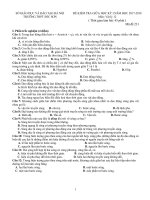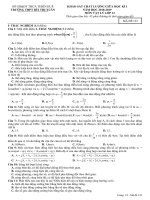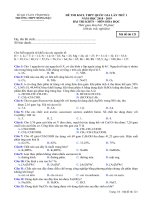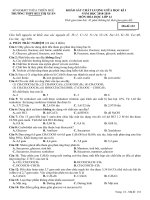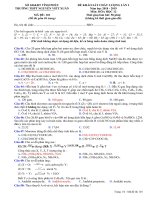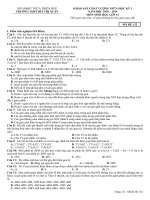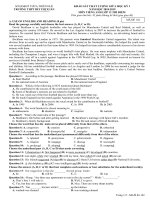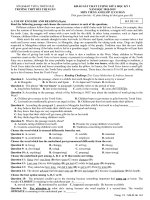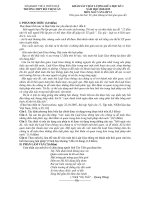Đề KSCL giữa học kỳ 1 tiếng anh 12 cơ bản năm 2018 – 2019 trường bùi thị xuân – TT huế
Bạn đang xem bản rút gọn của tài liệu. Xem và tải ngay bản đầy đủ của tài liệu tại đây (290.34 KB, 4 trang )
SỞ GD&ĐT THỪA THIÊN HUẾ
TRƯỜNG THPT BÙI THỊ XUÂN
KHẢO SÁT CHẤT LƯỢNG GIỮA HỌC KỲ I
NĂM HỌC 2018-2019
MÔN TIẾNG ANH LỚP 12 CƠ BẢN
Thời gian làm bài: 45 phút (không kể thời gian giao đề)
A. USE OF ENGLISH AND READING (8 pts)
MÃ ĐỀ 143
Read the following passage and choose the correct answer to each of the questions.
Different cultures follow their own special customs when a child's baby teeth fall out. In Korea, for example, they
have the custom of throwing lost teeth up on the roof of a house. According to tradition, a magpie will come and take
the tooth. Later, the magpie will return with a new tooth for the child. In other Asian countries, such as Japan and
Vietnam, children follow a similar tradition of throwing their lost teeth onto the roofs of houses.
Birds aren't the only animals thought to take lost teeth. In Mexico and Spain, tradition says a mouse takes a lost
tooth and leaves some money. However, in Mongolia, dogs are responsible for taking teeth away. Dogs are highly
respected in Mongolian culture and are considered guardian angels of the people. Tradition says that the new tooth
will grow good and strong if the baby tooth is fed to a guardian angel. Accordingly, parents in Mongolia will put their
child's lost tooth in a piece of meat and feed it to a dog.
The idea of giving lost teeth to an angel or fairy is also a tradition in the West. Many children in Western
countries count on the Tooth Fairy to leave money or presents in exchange for a tooth. The exact origins of the Tooth
Fairy are a mystery, although the story probably began in England or Ireland centuries ago. According to tradition, a
child puts a lost tooth umder his or her pillow before going to bed. In the wee hours, while the child is sleeping, the
Tooth Fairy takes the tooth and leaves something else under the pillow. In France, the Tooth Fairy leaves a small gift.
In the United States, however, the Tooth Fairy usually leaves money. These days, the rate is $1 to $5 per tooth, adding
up to a lot of money from the Tooth Fairy!
(Source: Reading Challenge 2 by Casey Malarcher & Andrea Jansen)
Question 1: According the passage, where is a child's lost tooth thought to be taken away by a mouse?
A. In Mongolia
B. In Mexico and Spain C. In Japan and Vietnam D. In Korea
Question 2: The phrase "the wee hours" in paragraph 3 probably refers to the period of time _______.
A. long before bedtime B. late in the morning
C. early in the evening D. soon after midnight
Question 3: According to the passage, which of the following is NOT true about the tradition of tooth giving in the
West?
A. Children give money to the Tooth Fairy.
B. Children hope to get money or gifts from the Tooth Fairy.
C. Lost teeth are traditionally given to an angel or fairy. D. Children put their lost teeth under their pillows.
Question 4: According the paragraph 2, parents in Mongolia feed their child's lost tooth to a dog because _______.
A. they believe that this will make their child's new tooth good and strong
B. they know that dogs are very responsible animals
C. they hope that their child will get some gifts for his or her tooth
D. they think dogs like eating children's teeth
Question 5: What is the passage mainly about?
A. Animals eating children's lost teeth
B. Presents for young chifdren’s lost teeth
C. Customs concerning children's new teeth
D. Traditions concerning children's lost teeth
Choose the word which is stressed differently from the rest.
Question 6: A. secure
B. marriage
C. confide
D. maintain
Question 7: A. comfortable
B. tendency
C. employee
D. national
Choose the word which has the underlined part pronounced differently from the rest.
Question 8: A. boxes
B. changes
C. arrives
D. misses
Question 9: A. developed
B. raised
C. concerned
D. maintained
Question 10: A. explained
B. disappointed
C. prepared
D. interviewed
Choose the underlined part among A, B, C or D that needs correcting.
Question 11: Since (A) I was born (B) there were (C) many changes (D).
Question 12: Last year (A) my little brother (B) got lost (C) while he had gone (D) shopping.
Question 13: They asked me how long (A) did it take (B) to get to (C) Paris by train (D).
Question 14: The doctor advised (A) him don’t stay up (B) late any longer (C) because it could harm (D) his health.
Choose the best option among A, B, C or D.
Question 15: The principal couldn't go to the meeting because something important had come up at home. The
word(s) CLOSEST in meaning to the underlined part is _______.
A. moved towards
B. mentioned by accident C. happened unexpectedly D. become available
Question 16: Pay attention to what she's saying because she won't explain it a second time. The word(s)
OPPOSITE in meaning to the underlined part is _______.
Trang 1/2 - Mã đề thi 143
A. remember
B. focus on
C. ignore
D. take notice of
Question 17: Pointing at someone to attract his/her _______ is usually considered rude in most social situations.
A. assistance
B. signal
C. attention
D. approach
Question 18: Laura: “I’ve just finished doing a very difficult exercise of maths.” Mum: “_______.”
A. Be careful
B. Thank you
C. That’s all right
D. Good job
Question 19: They said that their house had been broken into _______.
A. two days before
B. two days ago
C. since two days
D. the two days before
Question 20: They _______ part in any parties since they _______ there.
A. not to take / moved
B. don’t take / moved
C. didn’t take / had moved D. haven’t taken / moved
Question 21: Laura and David are talking about the benefits of swimming.
- Laura: “I think swimming helps us exercise all our muscles.”
- David: “__________.”
A. Yes, swimming does, too
B. You can do it. Thanks anyway
C. Not at all.You can make it
D. There is no doubt about it
Question 22: Keep silent. I _______ to concentrate. I can’t work with all that noise.
A. tried
B. am trying
C. try
D. have tried
Question 23: Nam wanted to know what time _______.
A. does the movie begin B. the movie began
C. did the movie begin D. the movie begins
Question 24: She is very tired now because she _______ all day.
A. is working
B. worked
C. has worked
D. has been working
Question 25: Many young people have objected to _______ marriage, which is decided by the parents of the bride
and groom.
A. sacrificed
B. contractual
C. agreed
D. confided
Question 26: When having days off, he always helps his wife tidy up the house. The word(s) OPPOSITE in
meaning to the underlined part is _______.
A. arrange
B. sort out
C. mess up
D. clear up
Question 27: Our parents join hands to give us a nice house and a happy home. The word(s) CLOSEST in meaning
to the underlined part is _______.
A. work together
B. help together
C. deal with
D. manage
Choose the word which best fits each gap of the passage.
Customs
Throughout the world there are different ___28___ for people to greet each other. In much of the world, a
handshake is the ___29___ form of welcoming and greeting someone. In many countries around the Mediterranean
Sea, a ___30___ kiss on the check is the appropriate way to welcome friends and family. It can be a very big surprise
if you expect to shake hands and get a kiss or a hug instead.
At times, it is difficult to tell what sort of greeting ___31___ is followed. People may bow, grab another’s arm or
even slap the other person on the back. In some places people just smile, look at ___32___ face and say nothing.
Question 28: A. ways
B. methods
C. means
D. techniques
Question 29: A. unique
B. same
C. different
D. common
Question 30: A. fast
B. superficial
C. light
D. heavy
Question 31: A. custom
B. routine
C. habit
D. tradition
Question 32: A. the other’s
B. each other
C. theirs
D. the others
B. WRITING (2 pts)
I. Rewrite each sentence, beginning as shown, so that the meaning stays the same.
1. She said to me, “Why didn’t you turn off the television last night?”
She asked ………………………………………………………………………………………..….………………..
2. The last time I came here was in 2005.
I have ……………………………………………………………………………………………..………………….
II. Put the words in the correct order to make meaningful sentences.
1. a/ month/ since/ ’s/ my/ It/ last/ cigarettes./ smoked/ father//
.……………………………………………………………………………………………………………………….
2. you/ wondered/ how/ They/ would/ area./ long/ stay/ in/ the //
.…………………………………………………………………………………………………….………………….
----------- THE END ---------Trang 2/2 - Mã đề thi 143
KHẢO SÁT CHẤT LƯỢNG GIỮA HỌC KỲ I
NĂM HỌC 2018-2019
MÔN TIẾNG ANH LỚP 12 CƠ BẢN
Thời gian làm bài: 45 phút (không kể thời gian giao đề)
SỞ GD&ĐT THỪA THIÊN HUẾ
TRƯỜNG THPT BÙI THỊ XUÂN
ĐÁP ÁN
A. USE OF ENGLISH & READING (8 pts)
Code
143
143
143
143
143
143
143
143
143
143
143
143
143
143
143
143
143
143
143
143
143
143
143
143
143
143
143
143
143
143
143
143
Q
1
2
3
4
5
6
7
8
9
10
11
12
13
14
15
16
17
18
19
20
21
22
23
24
25
26
27
28
29
30
31
32
B
D
A
A
D
B
C
C
A
B
C
D
B
B
C
C
C
D
A
D
D
B
B
D
B
C
A
A
D
C
A
A
A
Code
217
217
217
217
217
217
217
217
217
217
217
217
217
217
217
217
217
217
217
217
217
217
217
217
217
217
217
217
217
217
217
217
Q
1
2
3
4
5
6
7
8
9
10
11
12
13
14
15
16
17
18
19
20
21
22
23
24
25
26
27
28
29
30
31
32
B
D
B
C
B
D
B
C
C
B
C
A
D
A
A
A
D
A
C
B
B
D
A
B
A
A
D
C
D
C
C
D
A
Code
368
368
368
368
368
368
368
368
368
368
368
368
368
368
368
368
368
368
368
368
368
368
368
368
368
368
368
368
368
368
368
368
Q
1
2
3
4
5
6
7
8
9
10
11
12
13
14
15
16
17
18
19
20
21
22
23
24
25
26
27
28
29
30
31
32
C
C
B
B
D
C
B
D
D
C
A
B
B
C
A
B
B
C
A
D
A
A
C
A
D
D
D
A
D
B
C
A
B. WRITING (2 pts)
A
Code
476
476
476
476
476
476
476
476
476
476
476
476
476
476
476
476
476
476
476
476
476
476
476
476
476
476
476
476
476
476
476
476
Codes 143 & 368
I. Rewrite each sentence, beginning as shown, so that the meaning stays the same.
1. She said to me, “Why didn’t you turn off the television last night?”
She asked me why I hadn’t turned off the television the night before.
2. The last time I came here was in 2005.
I have not been here since 2005.
II. Put the words in the correct order to make meaningful sentences.
Q
1
2
3
4
5
6
7
8
9
10
11
12
13
14
15
16
17
18
19
20
21
22
23
24
25
26
27
28
29
30
31
32
B
C
A
C
D
B
D
A
D
C
A
C
B
D
B
A
C
D
B
B
A
D
D
C
B
C
B
A
D
A
A
C
A
1. a/ month/ since/ ’s/ my/ It/ last/ cigarettes./ smoked/ father//
It’s a month since my father last smoked cigarettes.
2. you/ wondered/ how/ They/ would/ area./ long/ stay/ in/ the //
They wondered how long you would stay in the area.
Codes 217 & 476
I. Rewrite each sentence, beginning as shown, so that the meaning stays the same.
1. Jack said, “Are you having lunch or going out with your mother now, Mary?”
Jack asked Mary if/ whether she was having lunch or going out with her mother.
2. How long have you studied English?
When did you start to study/ studying English?
II. Put the words in the correct order to make meaningful sentences.
1. time/ went/ to/ ago./ the/ The/ three/ supermarket/ I/ was/ last/ weeks //
The last time I went to the supermarket was three weeks ago.
2. had/ to/ know/ Jack/ mind./what/ changed/ wanted/ my//
Jack wanted to know what had changed my mind.
----------- THE END ----------
